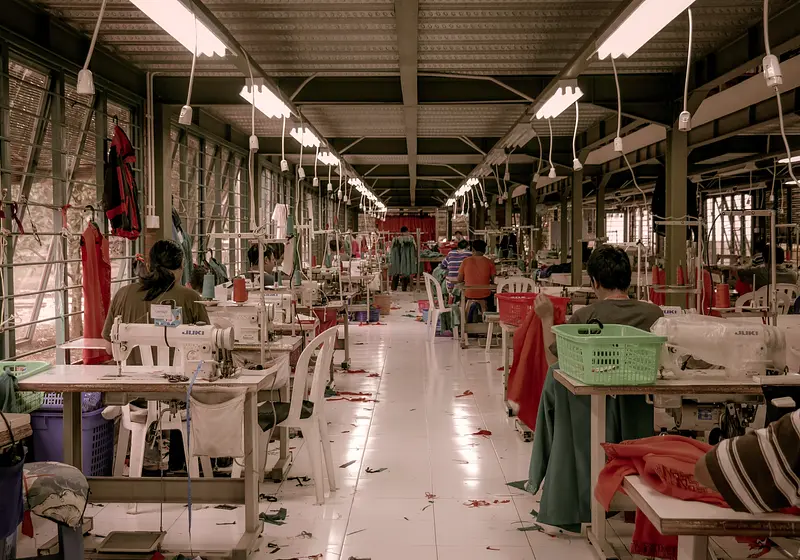In light of the environmental waste that fast fashion generates (think “floating islands of microfiber pollution in the sea”), the concept of “upcycling” or revamping discarded items such as second-hand or dead sock clothing into haute couture, is the latest sustainable way forward. By upcycling, you are upping the value of the original product instead of downcycling, and, according to The Upcycle Movement's founder Lynn Haughton, “upcycling continues the life of the object and keeps it out of landfills.”
A post shared by REFASH | Upcycled Fashion (@refash_) on Oct 19, 2019 at 5:28am PDT
By combining sustainability and cultural fashion, the following 5 upcycle brands are transforming what we consider as waste into runway-worthy fashion:
Let us slide into your dms 🥰
Get notified of top trending articles like this one every week! (we won't spam you)1) Doodlage
Doodlage is a zero-waste brand that makes its limited-edition collections out of consumer and factory waste. All elements of production and distribution keep sustainability in mind; converting material scraps into clothing, while waste made during production is converted into accessories and their packaging is made using in-house paper.
This concept of upcycling, according to Kriti Tula, who is Doodlage's co-founder, “was a deeply rooted tradition in India. Every garment was cherished and it was a good time for earth.” The clothes exude comfort and are made of light, breathable material, and their accessories, from purses and journals to masks and laptop sleeves, have very boho-chic designs.
A post shared by Doodlage (@doodlageofficial) on Jan 2, 2019 at 4:41am PST

Take the Quiz: What Candle Scent Matches Your Overall Aesthetic?
Halloween is just around the corner. It's time to light that candle. Take this quiz and find out what candle scent suits you best.
2) Reformation
Reformation's clothing and products look very fast-fashion-esque, but behind-the-scenes, Reformation is a sustainable haven. They follow a water-neutral policy by using less water-intensive fabrics (instead of Cotton which requires almost 20,000 gallons of water to make a tee-shirt) and by partnering with Bonneville Environmental Foundation, they are leasing water or incentivizing farmers to use only the water they need to use, rather than their full quota. They are very up-front in providing details about their factory policies, and their 'green standard' for production. A quick look at their 2019-2023 Sustainability Framework indicates their focus on better materials, and are investing in vegan/traceable leather sourcing, regenerative and organic cotton supplies, and eliminating sourcing from 'endangered species habitats and forests.'
A post shared by Reformation (@reformation) on Oct 7, 2020 at 2:14pm PDT
3) Refash
Refash calls itself the “World's First Platform for Upcycled Fashion,” since it is dedicated exclusively to upcycled products, such as clothing, jewelry, bags, and giftable items. The website features limited edition items and is “vocal for local” as it supports homegrown brands with ethical practices over the large industrial, supply chain fashion brands.
To 'refash” an item is to upcycle it into a “contemporary, useful, and creative product.” With its belief in conscious consumption and in a circular economy which promotes “reduce, reuse and recycle,” Refash also does pop up events where attendees can workshop ideas and create kimonos, scrunchies, etcetera, out of old fabrics.
A post shared by REFASH | Upcycled Fashion (@refash_) on Feb 6, 2020 at 6:19am PST
4) ASOS Reclaimed Vintage
ASOS, the U.K. online shopping brand, has a 'Reclaimed Vintage' section which revives vintage clothing and remodels them into classic fashion inspirations, from Polo shirts to classic hoops and boyfriend tees, ASOS upcycles out-of-season collections from famous brands, that are usually dumped, into fresh swag. With affordable prices, these are limited items that are worth checking out, even if its origins are dubious.
Brightening up our Tuesday with these daisy patch Levi's 🍍🌼💕 (🔎428356)
A post shared by @ reclaimedvintageldn on Jun 14, 2016 at 1:02pm PDT
5) Lota
LOTA's iconic patchwork shirts (not to mention its CGI models) are touted to be an “exploration into the intersection of sustainability, fashion, and technology” as they are made of 100% fabric waste. Since this is a niche fashion brand, each shirt is a limited edition print and is made to be long-lasting, in order to ensure that their clothes do not end up in landfills anytime soon.
A post shared by LOTA (@lotaindia) on Jun 24, 2020 at 12:16am PDT

















